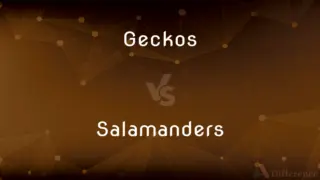Sweetest Day vs. Valentine's Day — What's the Difference?
By Tayyaba Rehman — Published on January 25, 2024
Sweetest Day is a holiday observed in some parts of the United States, focusing on expressions of love and kindness, often to the disadvantaged. Valentine's Day is a globally recognized day celebrating romantic love, typically between couples.

Difference Between Sweetest Day and Valentine's Day
Table of Contents
ADVERTISEMENT
Key Differences
Sweetest Day, primarily celebrated in the Midwestern United States, originated in the early 20th century as a day to distribute sweets and small gifts to the underprivileged. Valentine's Day, with ancient roots and global recognition, is celebrated on February 14th as a day of expressing romantic love, often with gifts, dates, and romantic gestures.
The ethos of Sweetest Day leans towards altruism and charitable acts, encouraging people to show kindness and affection not only to romantic partners but also to friends, family, and those in need. Valentine's Day, conversely, is more focused on romance and intimate relationships, symbolized by hearts, roses, and Cupid.
Sweetest Day is observed on the third Saturday of October and remains relatively less known outside of certain U.S. regions. Valentine's Day is a widely recognized event across many countries, often commercialized with a heavy focus on gift-giving between lovers.
The celebration of Sweetest Day involves giving small tokens of appreciation, like candy and cards, to a wider circle of loved ones and community members. Valentine's Day typically involves more elaborate gestures and gifts such as jewelry, luxurious dinners, and romantic getaways for couples.
Sweetest Day, while it has grown in commercialism, still retains an element of kindness and community spirit. Valentine's Day, though initially linked to a Christian saint, has evolved into a secular celebration of romantic and, increasingly, platonic love.
ADVERTISEMENT
Comparison Chart
Origin
Originated as a day to help the underprivileged
Ancient roots, now celebrates romantic love
Primary Focus
Altruism, kindness, broad expressions of love
Romantic love, intimate relationships
Date of Celebration
Third Saturday of October
February 14
Common Practices
Gifts of sweets, acts of kindness
Exchange of romantic gifts, dates
Geographical Popularity
Mainly Midwestern United States
Globally recognized
Compare with Definitions
Sweetest Day
Midwestern Tradition: Primarily celebrated in the Midwestern U.S.
Sweetest Day is a special occasion in our Midwestern community.
Valentine's Day
Gifts and Gestures: Known for exchanging gifts like chocolates and flowers.
I received a bouquet of roses on Valentine's Day.
Sweetest Day
October Celebration: Observed on the third Saturday of October.
We’re planning a community event for this year's Sweetest Day.
Valentine's Day
Symbolized by Hearts and Cupids: Associated with hearts, red roses, and Cupid.
Shops are filled with heart-shaped candies and cards for Valentine's Day.
Sweetest Day
Day of Kindness: A day to perform acts of kindness.
On Sweetest Day, we volunteer at the local shelter to spread joy.
Valentine's Day
February 14th Tradition: Celebrated annually on February 14.
Restaurants are often fully booked on Valentine's Day.
Sweetest Day
Focus on Community Spirit: Emphasizes community and altruism.
Sweetest Day is an opportunity to show we care about those around us.
Valentine's Day
Romantic Celebration: A global celebration of romantic love.
Valentine's Day is when we plan a special date night.
Sweetest Day
Gift-Giving to All: Involves giving sweets and cards to various people.
I give homemade cookies to my neighbors on Sweetest Day.
Valentine's Day
Focus on Couples: Especially significant for romantic partners.
Many couples get engaged on Valentine's Day.
Common Curiosities
What is Sweetest Day?
Sweetest Day is a holiday observed in the Midwestern U.S. to spread kindness and remember the underprivileged.
Can friends celebrate Sweetest Day?
Yes, Sweetest Day is also about showing appreciation to friends and family.
How did Sweetest Day originate?
Sweetest Day originated in the early 20th century in Cleveland, Ohio, as a day to distribute sweets to the underprivileged.
Is Sweetest Day similar to Valentine's Day?
While both celebrate love, Sweetest Day has a broader focus on altruism and includes all loved ones, not just romantic partners.
What's the significance of Valentine's Day's date, February 14?
February 14 is believed to be the day Saint Valentine died, which has evolved into a day celebrating love.
What is Valentine's Day?
Valentine's Day is a global celebration of love, particularly romantic love, observed on February 14.
Who celebrates Sweetest Day?
Sweetest Day is primarily celebrated in the Midwestern United States.
What are typical Valentine's Day gifts?
Typical gifts include chocolates, flowers, jewelry, and romantic dinners.
Is Valentine's Day a public holiday?
Valentine's Day is not a public holiday in most countries but is widely recognized and celebrated.
Do people go on dates during Sweetest Day?
Yes, some people go on dates, but the day is more about general kindness than romantic love.
How is Sweetest Day celebrated?
It's typically celebrated by giving small gifts like candy and performing acts of kindness.
What kind of activities are done on Valentine's Day?
Common activities include exchanging gifts, going on romantic dates, and sending love messages.
Is Sweetest Day commercialized like Valentine's Day?
Sweetest Day has some commercial aspects, but it's generally less commercialized than Valentine's Day.
Is Valentine's Day celebrated worldwide?
Yes, it's celebrated in many countries around the world, though traditions may vary.
Can Sweetest Day be celebrated by couples?
While not specifically for couples, they can certainly celebrate it as a day of love and kindness.
Share Your Discovery

Previous Comparison
Geckos vs. Salamanders
Next Comparison
DFD vs. ERDAuthor Spotlight
Written by
Tayyaba RehmanTayyaba Rehman is a distinguished writer, currently serving as a primary contributor to askdifference.com. As a researcher in semantics and etymology, Tayyaba's passion for the complexity of languages and their distinctions has found a perfect home on the platform. Tayyaba delves into the intricacies of language, distinguishing between commonly confused words and phrases, thereby providing clarity for readers worldwide.











































